“Loud Music” Murder Trial Day 1: Animosity and Provocation Narratives Emerge
State emphasizes Dunn’s animosity, premeditation; the Defense weak police work, provocation, emotional trauma
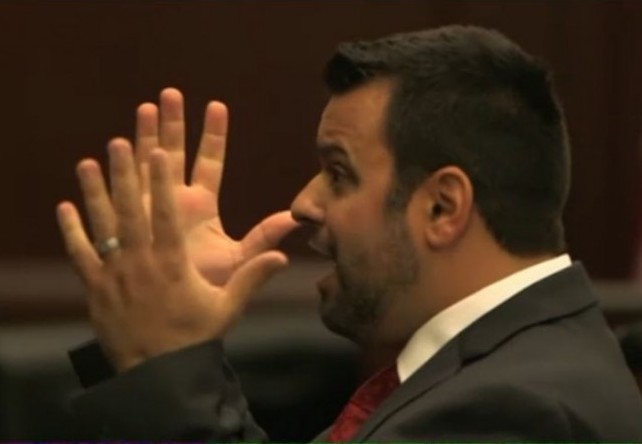
The key legal narratives of both the State and defense began to emerge this afternoon as the Michael Dunn “loud music” murder trial kicked off with an afternoon launch.
Dunn, 47-years-old, is charged with 1st degree murder for the shooting death of 17-year-old Jordan Davis. The State believes Dunn shot Jordan out of anger over Jordan’s loud music, whereas Dunn claims he shot in lawful self-defense. Dunn is also charged with attempted murder for shooting the other three young men in the car, Leland Brunson, Tevin Thompson, and Tommie Storns. Finally, he is charged with the offense of firing a gun into an occupied vehicle.
The trial started with Judge Russel Healey instructing the jury on their responsibilities in hearing the case, as well as various procedural facets common to any criminal trial.
Assistant State Attorney John Guy Delivers Opening for Prosecution
Following these introductory remarks, the State’s opening was presented by Assistant State Attorney John Guy, and delivered in the emotive style so familiar from his performances during the Zimmerman trial. Alas, he chose to speak in such a soft voice that he was essentially inaudible. The use of headphones, however, makes it possible to hear his remarks.
Consistent with the state going for 1st degree murder, and barring that 2nd degree murder, Guy emphasized the several concrete steps Dunn had to take in order to bring fire upon the Durango — open glove compartment, remove pistol, chamber a round, grip the gun with both hands, fire, fire again, fire again, etc. — all presumably to set the hook for premeditation and first degree murder. In addition, he emphasized Dunn’s angry use of deadly force violence in response to being, as Guy put it, merely disrespected, to set the hook for malice necessary for second degree murder.
Attorney Cory Strolla Delivers Opening for the Defense
Defense Attorney Cory Strolla spent roughly twice as much time on his opening remarks, focusing on the three themes beloved by all defense counsel. First, the evidence is weak and contradictory and was collected and evaluated by police and prosecutors in an unprofessional and untrusthworthy manner. Second, if any one of the jurors has not been convinced beyond a reasonable doubt of Dunn’s guilt, “stick to your guns” and do not allow yourself to be persuaded by the other jurors — each of you is bound to make your own decision. And three, if you can hold off coming to a conclusion until we have a chance to present our side of things, you’ll see that there are reasonable explanations for our client’s conduct on every front.
Following the defense opening statement, Judge Healey moved immediately to the state’s witnesses for the day, which numbered seven. Unlike her background role in the Zimmerman trial, here State Attorney Angela Corey took the leading role, assuming responsibility for direct questioning herself.
Elia Harris, Girlfriend of Jordan Davis
The first state witness was Elia Harris, girlfriend of Jordan Davis, who met with Davis shortly before his death later that night. The State’s focus was on whether it appeared that Davis might have been angry that evening. Harris indicated he was not. The defense asked if Harris was aware that Davis was armed with a knife that night She said she was not. That was about it for Harris, whose primary value for the State would seem to be the generation of sympathy for Davis among the jury.
Steven Smith, General Contractor
The second State witness, and the one longest on the witness stand, was Steven Smith, a general contractor. Smith arrived at the gas station when the red Durango SUV was blasting its loud music — in fact, he left a parking spot beside the Durango to move to a more distant spot, specifically because of the noise — and was walking out of the gas station market when the shots were fired. Corey used this as an opportunity to ask whether there were plenty of parking spaces available, and he agreed that there were. This was clearly intended to plant in the jurors’ minds the notion that Dunn could simply have done as Smith, and moved his car to a further spot, rather than initiate his interaction with the Davis group.
Perhaps the most damning point of Smith’s testimony for the defense is when the State had him describe what he heard Dunn shout: “YOU’RE NOT GOING TO TALK TO ME THAT WAY!” They even had him shout it in the courtroom at the approximate value he heard it the night of the shooting. When asked if he heard anyone in the SUV speak to anyone, he answered, “No, ma’am.”
The State also had Smith mimic the motions of Dunn retrieving, charging, and firing his gun. The emphasis on the fact that Dunn had to first chamber a round in his semi-automatic pistol will surely be a lynchpin of the State’s arguments supporting the premeditation necessary for a 1st degree murder conviction.
It was also during Smith’s testimony (as well as later) that the surveillance audio/video was played in court, allowing one to hear the tempo of the 10 fired shots. They occurred in three distinct bursts, with each burst being fired about as rapidly as a typical person can manipulate a trigger: BANGBANGBANG . . . BANGBANGBANGBANG . . . BANGBANGBANG.
Smith also testified that he never saw any of the young men exit the car prior to the shooting, or with a weapon, nor throw anything from the car.
On cross examination, Cory Strolla emphasized that in fact Smith did not have the SUV under continuous surveillance, particularly when it had pulled away from the station and before it had returned. Smith conceded this point.
The defense gained a little ground when Smith conceded that he had characterized Dunn’s demeanor following the shooting as “panicked.”
Other than that, however, Smith was mostly quite damaging to the defense.
Perhaps it was because of this that Strolla made what certainly appears a remarkable blunder near the end of his cross of Smith, when he asked him: “Is it possible that what you heard Dunn say is, “You’re not going to kill me?” rather than “You’re not going to talk to me?” Smith simply responded, “No, sir.”
Andrew Williams, Christian Chaperone
The court then recessed for a 20 minute break, before returning with the State’s third witness, Andrew Williams.
Williams was in the vicinity of the gas station that night because he and his wife were chaperoning two teenagers from the church on their first date. Williams appears to have arrived at the scene after the shooting, after both the Durango and Dunn’s Volkswagen had pulled away, and just as the Durango pulled back up in front of the convenience store at the far end of the curb parking. Williams became clearly emotional at several points in his testimony, especially when he described observing the mortally wounded Davis inside the SUV, working with a police officer to place Davis on the ground, and attempting to perform CPR.
Presumably because of his physical activity in removing Davis from the SUV, Corey asked him if he had seen anything that could have appeared like a weapon. Williams said no. She also asked him about the demeanor of the three other young men in the SUV, whom William described as “shook up.”
“Were any of them crying?” Corey asked. “All of them,” answered Williams.
On cross examination Strolla again emphasized how traumatic an event it had been for all involved — unstated, of course, was for Dunn, as well. He also spent considerable time asking Williams, in a rather mocking manner, about his first aid qualifications. These were, in fact, almost non-existent, being based on his time as a junior life guard 5 years earlier. Corey effectively undid whatever defense value this line of questioning was supposed to have by asking on re-direct,”Weren’t you just trying to help?” to which Williams responded softly, “Yes.”
Strolla also emphasized that Williams had not, in fact, carefully observed all the activities around the Durango and by the other young men inside that vehicle, and that he had in fact not been observing them at all during the time they had initially pulled away from the gas station. This, presumably, to buttress his argument that the men in the vehicle had left to dispose of their weapon before returning to the gas station to seek help for Davis.
Shaun Atkins, Convict
The next witness for the state was Shaun Atkins. He was living with his girlfriend out of his car at the time, homeless, when he observed the events at the gas station. Later, he would be convicted of 25 felony counts of theft, and he is currently serving a 7-year sentence after having been prosecuted by Corey’s office. He appeared in court wearing green prison garb and hand-and-foot manacles. (These could be heard jangling and banging against the witness table and chair throughout his testimony.) It was Atkins, remarkably enough, who had noted and written down the license plate number of Dunn’s Volkswagen.
Otherwise, Atkins’ testimony was unremarkable, except for when the 25-count felony thief explained why it was that he had waited outside, beside his car, while his girlfriend went alone into the convenience store to purchase some items: “I stayed to watch our stuff, make sure nothing was stolen.” Irony.
Following the questioning of Atkins, Corey stepped aside and Assistant State Attorney Erin Wolfson assumed responsibility for direct examination of the state’s remaining witnesses for the day.
Mariah Grimes, Gas Station Cashier
The first witness questioned by Wolfson was Mariah Grimes, a clerk at the Gates gas station working the register the night of the shooting.
It was during her testimony that we again saw the surveillance footage, and heard the tempo of the fired shots. In the footage, Grimes can be seen handling a transaction for items being purchased by Dunn’s fiance.
Sadly, I was compelled to step away during the direct of Grimes, so I’ll have to defer to other sources to share those events. When I returned, Grimes was being cross-examined by Strolla. Strangely, Grimes seemed to place the Durango several parking spaces away from Dunn’s Volkswagen, whereas every other relevant witness had placed the cars in adjacent parking spots. Strolla also again emphasized the stress of the event, noting, “You were freaked out, fair to say? You were shaken up?” Grimes agreed.
Strolla also spent considerable time noting that the witnesses to events had been gathered together by law enforcement in such a manner that they could have discussed each other’s perceptions of events and thereby effectively contaminated their later recollection. Not much ground seemed to be gained here by the defense.
Lillian Christiansen, Gas Station Manager
Next up was Lillian Christiansen, the assistant manager at the Gates gas station the night of the shooting.
Christiansen was remarkably accurate in her recollection of the number of shots fired, being almost perfectly correct for each of the three bursts. (Eye witnesses are infamously poor at shot counting and recollection.) Wolfson also had Christiansen’s 911 call played for the jury, bringing back memories of the Zimmerman trial.
On cross it soon became evident that Christiansen held considerable resentment towards Strolla. When he mentioned, for example, that he wanted to make sure he wasn’t putting words in her mouth, she assured him that he wasn’t, paused, and added, “This time.” Strolla asked, “So, we’re doing OK then?” She answered, “So far.”
Strolla used his cross to again try to cast the police as incompetents, pointing out that they had not asked Christiansen for the surveillance recording but rather she had offered it to them. He also again repeated his “traumatic events” meme, for the same purposes as previously noted.
Samantha Eichas, Auto Parts Delivery Driver
Finally, the last witness of the day was Samanta Eichas, who is a parts delivery driver and was out working that night when she stopped at the gas station convenience store.
Only questioned for a few minutes by either side, Eichas interestingly described the gun fire as a single burst. Upon being asked by Wolfson, she described the demeanor of the three survivors of the shooting as “shocked.”
On cross Strolla mostly banged some more on the “traumatic events” meme. He also again sought to undermine police credibility by having Eichas discuss how even after she was detained she was permitted to talk with her boyfriend numerous times by cell phone — again, the types of acts that could theoretically contaminate eye witness testimony.
Upon re-cross, Wolfson emphasized that Eichas’ boyfriend was also her auto parts manager at the time, and it was necessary for her to call in to explain why she wasn’t making her deliveries and where the work truck she was driving was located.
And that was it for the first day of the trial. The jury’s notes were gathered up and secured by the bailiffs, and the jurors were led away to sequestration in their hotel.
Tomorrow morning we’re back at it again, 9AM. Join us!
Andrew F. Branca is an MA lawyer and the author of the seminal book “The Law of Self Defense, 2nd Edition,” available at the Law of Self Defense blog, Amazon.com (paperback and Kindle), Barnes & Noble (paperback and Nook), and elsewhere.
Donations tax deductible
to the full extent allowed by law.

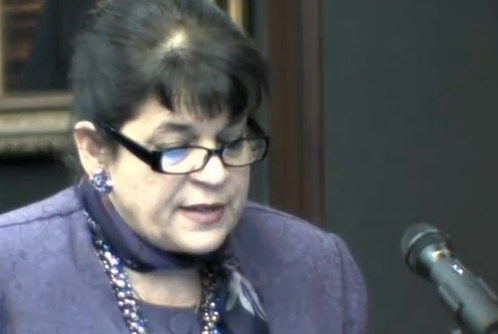
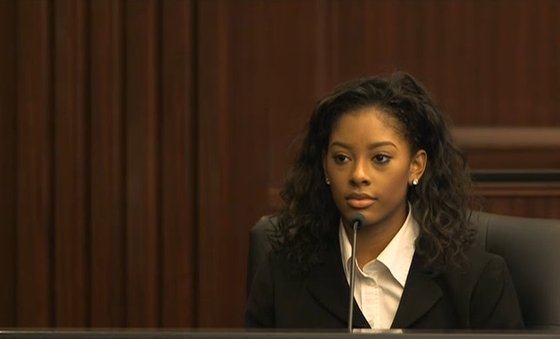
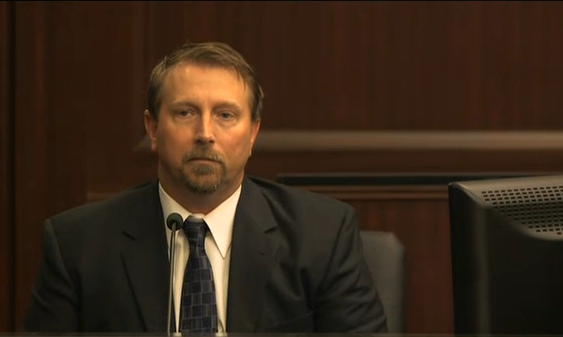
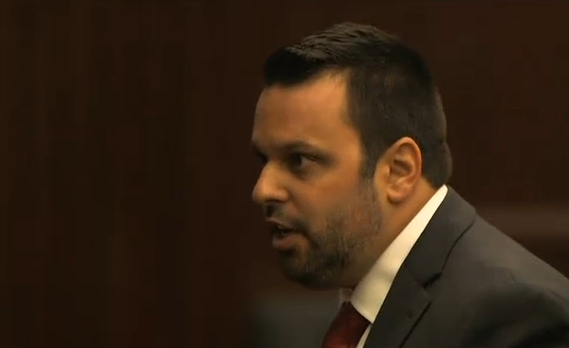
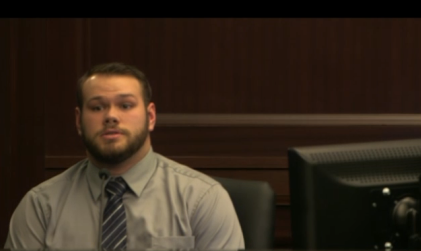
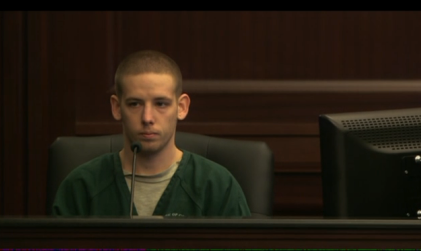
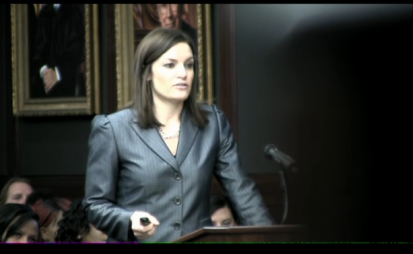
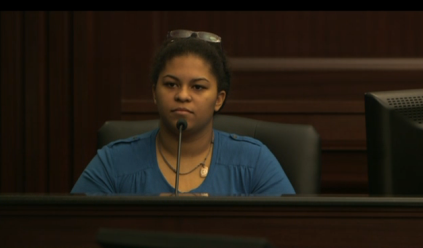
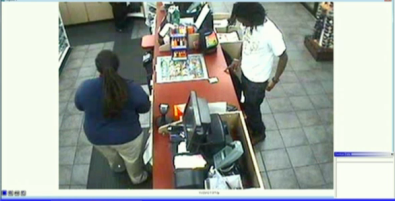
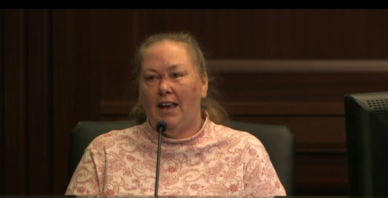
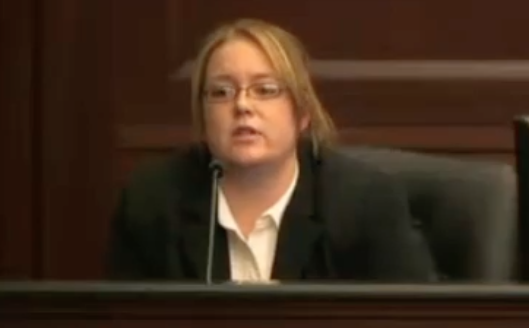







Comments
Excellent commentary, Andrew. (As usual.) I’m so glad you’re covering this case.
I was quite surprised by Angela Corey. She had a gentle persistence and precise style of questioning, and IMO she came across well which I wasn’t expecting. I guess having evidence to support one’s case makes all the difference.
I found her court room performance very methodical, deliberate, professional. Far above that of her staff in the Zimmerman case. I also found her demeanor one that a jury would likely find appealing, quite the contrary of my experience of her demeanor outside the court room.
One begins to understand how she attained her position.
That said, it remains a travesty that no sanctions have ever been, or apparently will ever be, brought against her and her prosecutorial team in the Zimmerman trial for their despicable concealment of exculpatory discovery evidence. (The very bringing of the charges was ridiculous, but I can put that off to politics. The hiding of exculpatory evidence is profoundly ugly and wrong.)
Now, ask me how I really feel about it. 🙂
–Andrew, @LawSelfDefense
One thing I noticed was that both prosecutors tended to lead quite a bit and the defense didn’t object. I noticed because of the police interview I heard yesterday of one of the witnesses where the cops were really leading a witness, to the point where I thought they were pushing a narrative on the witness.
In the same vein, I think Strolla asked each witness if he was putting words in their mouth. It was only Christiansen who got a little snippy with him.
You seem to think that the rules that apply to questioning witnesses in court also apply when the police are questioning witnesses in an investigation.
They don’t.
The police can not only lead a witness, they can lie their asses off in questioning a witness.
Fact that the police investigators engaged used “leading questions” is utterly meaningless, except that one might use that fact to try to undermine the credibility of the responses (good luck). It is totally permissible.
Once in the court room, the use of leading questions is much more restricted (but even there, allowed, under certain circumstances).
–Andrew, @LawSelfDefense
I didn’t suggested that police asking leading questions is not allowed, what I suggest is that police asking leading questions of a witness ( Atkins I think ) is poor interview technique. I remember back in the Janet Reno child molestation days interviewers using such techniques and getting false statements of child abuse.
Here is the video I am talking about:
https://www.youtube.com/watch?v=DexfP2w7b3Y&list=PLbZC8k3EaPps2gd57Dit2dKpDlkX2rN3D&index=4
Prosecutors are supposed to seek justice and prosecute people they objectively believe broke the law. Angelea Corey is doing that in this case. Even if you can say there was enough evidence to bring a case against Zimmerman, what the prosecution did in that case was unforgivable in the manner they prosecuted it.
Time for a poll – how many think Dunn will testify (IMO he will, against advice of counsel).
And he’ll finish hanging himself on the stand.
Fast verdict coming, all top count(s) ‘guilty’.
The audio of the shots is devastating to any claim of self defense, IMO. 3 fast rounds, long pause, 4 fast rounds, longer pause, 3 more. Never a return shot.
That’s not a ‘gunfight’, that’s ‘I’ll show you to talk to me like that, you little black bastards’. AKA murder and attempted murder.
Maybe the kids were smarting off some – not surprising. But not a deadly assault. Dunn started the whole thing by not simply STFU’ing in the first place, or parking elsewhere like the other guy did.
No weapon found other than Dunn’s. And I don’t buy for a minute the proposition that ‘the cops didn’t look for one’.
IMO Dunn should have taken whatever deal Corey offered him, if any. But I’m just as glad he didn’t – he doesn’t deserve any breaks for what he did. Guns are not supposed to be for emptying in the direction of everyone who pisses you off a little.
The pauses between bursts are troubling, especially if Strolla’s claims that Dunn has received training has any semblance of truth.
Tactically speaking, those pauses are where one assesses the effect of one’s fire, and determines whether additional force is needed in self-defense. But each assessment is de novo.
Each pause implies that Dunn felt the imminent threat was apparently resolved (or he would have kept shooting), and then something triggered him to re-engage. What?
Even if there was a reasonably perceived (if mistaken) “weapon” for the first three-round burst, did it happen again for the second burst? The third? Ugh.
It’s as if having decided to fire at all, Dunn lost control of his use of force. Frankly, it’s a sentiment seen too often on many gun forums–“I’ll keep shooting until the gun is empty.”
Don’t know if the State plans to introduce a use-of-force expert to expound on these issues, but they’d be fools not to.
–Andrew, @LawSelfDefense
So much for paying attention. He did not empty his gun. There were still 5 rounds left in the clip.
Which makes all the difference. uh… right?
It makes the difference between getting the facts straight and not.
If you were replying to a policeman or a lawyer trying the case I would agree. You’re not. A person said “emptying” instead of shooting 2/3 of the magazine.
Magazine, not clip.
cool, no need for a trial then.
no sense listening to all the evidence first, that’s just a waste of time.
Andrew – what does it take for Dunn’s letters and phone calls to come in ? Does he have to take the stand first, or/and can the recipients be called to testify about them ? Or would that then be hearsay if Dunn doesn’t testify ?
I only listened to part of Smith’s testimony, but I think Strolla should have emphasized that Steven Smith did not witness the first interaction between Dunn and the SUV occupants. The surveillance video shows there was only a short period of time between the firing of the gunshots and when Smith left the store; Smith walked into the middle of the event. Moreover, Smith testified that Dunn said “you’re not going to talk to me that way.” However, Smith did not hear the comment that prompted Dunn’s response.
“However, Smith did not hear the comment that prompted Dunn’s response.”
Under what circumstances, other than dealing with one’s own minor children, would that EVER be a response likely to lead to a positive outcome?
That testimony was devastating, allowing the inference of malice. And Strolla’s late effort to unwind it was inept, and worse than not making the attempt.
Of course, we’re still really only hearing the State’s case. Corey OUGHT to be “winning” at this point. One of the most shocking parts about the Zimmerman trial was how the State continually fell further behind even during their own half of the trial.
–Andrew, @LawSelfDefense
My thoughts are geared towards the possibility that a threat was made. Since Smith did not witness the beginning of the confrontation, he is unable to provide direct testimony regarding a possible threat made against Dunn. Yes, Smith’s testimony hurts the defense. However, it does not rule out the possibility that a threat was made towards Dunn. Davis could have threatened Dunn to which Dunn replies “You’re not going to talk to me that way.”
That really makes sense to you?
Someone threatens you with imminent death or grave bodily harm (the only justification for Dunn firing on them), and your immediate response is to tell them “You can’t talk to me that way”?
Were it me, I’d be too busy dealing with the imminent threat of death to be shouting about how I’m offended by their commentary.
In any case, none of that gets him past not self-reporting, explaining events in real-time, etc. If there was a weapon, and it was disposed of, that was largely made possible precisely because Dunn fled the scene.
–Andrew, @LawSelfDefense
According to Strolla the next day Dunn called a police friend and was on his way to talk to him about how to best report himiself. We’ll see if he testifies.
I couldn’t care less if they DO get his “Fed cop buddy” to testify. Dunn had immediate access to 911 from the moment he fired those rounds until the cops found him. But he didn’t bother.
If the State can’t sell that as malfeasance to the jury, they ought to throw themselves in front of a train. (Again.)
–Andrew, @LawSelfDefense
Sigh I hate when you do not get a “reply” button so have to reply to an earlier post.
So are you saying Dunn did not have a right to call his lawyer the next day, BEFORE calling the police. Or are you saying that Dunn did not have the right to get advice from anyone other then a lawyer in those circumstances?
Oofah.
I’m saying there are so many fundamental errors in your understanding of the law and how it works, and you are so determined to interpret it in ways contrary to reality, that I have neither the interest nor time to correct you–in any case, I don’t think the correction would take.
You are free to continue to post your comments here (subject, as all of us, to Professor Jacobson’s judgment).
But this is the last response you’ll get from me.
Best,
–Andrew, @LawSelfDefense
Whatever was said, a verbal threat alone is not justification for forcible response.
^^^Also this^^^
Verbal threat does not justify shooting. I’ve only been in that situation once in my life. Dark rainy night, empty street, drunk black guy came up for no reason to start shit.
His verbal threat was rather clear – “I have a gun right here, MF’r, I’m gonna bust a cap in your ass right now MF’r”. All while his hand was behind his back at belt level.
He did not notice my hand was in my pocket. Nor could he see the .357 snubby in it. Had his hand re-appeared with so much as a pocket comb in it, he would have died on that street. His hand came out empty, mine remained in my pocket, I backed away slowly and called 911 when I got home.
I dunno, I always thought the bestest firstest thing to do when it comes to avoiding conflicts on the street with strangers was to actively avoid conflicts on the street with strangers.
Some common techniques include ‘shutting the F’ up’, ‘walking away’, and ‘driving away’. ‘Be elsewhere’ is a good one, too. As an added benefit (not getting your ass kicked, not getting killed, etc), you get to not be put in jail to await trial on murder charges.
Dunn apparently disagrees.
Did anyone else notice his permanent pissed off expression ? Not a good thing for him, IMO.
^^^THIS^^^
–Andrew, @LawSelfDefense
Dunn started the whole thing by not simply STFU’ing in the first place
No, the start of “the whole thing” was music so annoying that at least one other customer moved his car elsewhere.
But that’s not what the trial is about. The trial is about a clear subset of “the whole thing”, specifically the use or misuse of deadly force. General considerations like obnoxious music, rude kids, or uppity middle-aged types are not the issue per se.
“No, the start of “the whole thing” was music so annoying that at least one other customer moved his car elsewhere. ”
Bullshit.
If you think loud music is ‘the starting point of something that leads to a shooting’, or other trivial daily annoyances like it, you better get help FAST. Before we have to watch you on an Internet stream of your trial.
It’s clear enough that I don’t think any such thing. But you sure seem to.
Seems to me you guys have cross-threaded. Take a breath, start again tomorrow.
–Andrew, @LawSelfDefense
“Dunn started the whole thing by not simply STFU’ing in the first place.”
“No, the start of “the whole thing” was music so annoying that at least one other customer moved his car elsewhere.”
Since when is asking people to turn down loud music a crime? Since when is going to complain to a theatre manager about a person texting a crime? Since when is getting out of a car a crime?
Sure bad things happened afterward, and the court system will sort things out, and it may well be that the people who did these things later did something wrong.
But to hear people talk, the people that did these things are guilty because they did these things.
Next thing we will hear is that a woman is guilty of murder for being out alone at night and having to kill a rapist.
Or a guy is guilty of murdering a mugger because he left his house.
Or a guy is guilty of murdering a burglar because he stayed at home.
With some people you just can’t win.
@ MouseTheLuckyDog
Stuff happens, people get shot, and the law sorts it all out.
But the REAL problem is that you can’t legally shoot people after complaing to the manager about someone texting during the movie, or shoot up a bunch of teens after complaining about the noise.
It’s JUST like a woman shooting a rapist.
LOL.
Seriously?
Are you for real?
@Yukio
“The stuff happens” is refering to all the things that happen in between .
You say you can’t shoot a guy after complaining to a manager about texting. You can if the guy pulls a knife when you get back.
You say you can’t shoot up teens after complaining about loud music. You can if they try to shoot at you.
More and more I am seeing statements like this.
“Trayvon would still be alive if George had not got out of the car.” Translation. “George is legally and ethically responsible because he got out of the car.”
“Davis would still be alive if Dunn had not complained about music.”
Translation. “Dunn is morally and legally responsible because he complained about the music.”
“Coulson (?) is dead because whathisname complained to the manager” Translation. “whathisname is ethically and legally responsible because he compalined to the manager”
So a woman who goes out alone night, someone attempts to rape her and she shoots him. “The rapist is dead because she went out alone at night.” Translation. “A woman is morally and legally responsible if she goes out alone at night.”
You don’t see how that follows? Really? Really?
Try these statements instead:
A woman should have the right to go out at night alone.
Or in these cases:
“A person should be able to get out of his car and look around.”
“A person should have the right to ask others to lower their music.”
“A person should have the right to complain to the manager about texting.”
@ MouseTheLuckyDog
“‘The stuff happens’ is refering to all the things that happen in between .”
Which is what most people are discussing on Branca’s posting. That “stuff” is what’s legally, in the broad term, relevant.
“You say you can’t shoot a guy after complaining to a manager about texting. You can if the guy pulls a knife when you get back.”
But that’s not what appeared to have happened in that Florida(?) case. You could also shoot him IF he pulls out an AK-47, or IF is strapped to a suicide bomb, or IF he’s beating a little girl to death with a pipe. So what?
“You say you can’t shoot up teens after complaining about loud music. You can if they try to shoot at you.”
That’s pretty likely NOT what happened to Dunn since the only shots fired were out of his gun, and no other guns were in evidence nor were witnessed by anyone else except Dunn– whose actions (going to get gun out of the car and returning, yelling angrily at victims, fleeing the scene, not reporting the incident, ordering a pizza afterward, etc.) do not put him in the best light. So, why are you playing the IF game with this? It’s pointless.
“More and more I am seeing statements like this.” etc.
Fine, but who is saying that here? Me? Anyone?
People have said that ignoring a DAILY annoyance, like loud music, for a few minutes is the safest course of action. Even if you believe Dunn’s story, which I do not, doing this would have kept Dunn and his girlfriend out of harm’s way. Avoiding a needless confrontation is the first level of self-defense. This has nothing to do with defending yourself against stalking rapists.
What you wrote earlier is “Since when is asking people to turn down loud music a crime? Since when is going to complain to a theatre manager about a person texting a crime? Since when is getting out of a car a crime?”
No one in this thread has written that one does not have the “right” to complain to a theater manager, nor to complain about loud music, nor that a woman does not have the right to go out at night. No one. People have said that it’s not very smart to start a confrontation over rather trivial annoyances– like loud music at a parking lot that you’re going to be at for a few minutes– especially when there are easy alternatives.
You wrote: “‘Davis would still be alive if Dunn had not complained about music.’
Translation. ‘Dunn is morally and legally responsible because he complained about the music.'”
No one has said this here. Many have said “Dunn is morally and legally responsible for shooting up a car full of teens.” And he is. There is NO QUESTION of that. He took that action. People have it on tape. The question is was Dunn legally justified in this action. The answer, based on what’s been seen, is very, very likely no.
And don’t compare the Dunn case with the Zimmerman case. It’s way past apples and oranges.
So much for paying attention. He did not empty his gun. There were still 5 rounds left in the clip.
Oops. Wrong place.
Oh, you got me. As if I didn’t know how many rounds were left. As if I didn’t write those facts out in a post yesterday. Sheesh.
You focus on that, I’ll focus on something substantive:
How many of those 10 shots fired were justified? Every single one?
I rather doubt it.
But that’s the standard. If even the last one was not justified, that’s the attempted murder, and firing into vehicle charges.
And if jury buys that part of State’s case, good chance they’ll buy much of rest.
–Andrew, @LawSelfDefense
And it’s Murder. Not just the lessers you mention. Someone died.
If I fire 10 rounds at you, and kill you with one of them, the order does not matter, nor does the quantity. I killed you.
As you asked, ‘Were ALL TEN ROUNDS JUSTIFIED ?’ THAT is the question. Personally I suspect, barring something amazing from the defense, NONE of them were, let alone all ten.
His calmly gathering up his GF, leaving, driving home several hours away ‘because she was concerned about her dogs’, ordeing pizza, and having a nice drink (never stopping, never calling 911, nothing), all the while konwing that he had just let off 10 rounds at a car full of people at point balnk range, is HUGELY damaging to any claims of ‘lawful self defense’, and go clearly to any reasonable person towards ‘running away so as to not get caught’. which is ‘guilty mind because he KNEW he did wrong’.
The gun shots came in three volleys. The initial one, when Dunn claims he saw a rifle, the second as the car backed away when he though they might drive into him (I’m just guessing here ), the third as the car drove away when he fired to force them to “keep their heads down”. From a self defense point of view all sound legitimate.
The question of whether or not each round in each volley was needed, I think the only way to know for sure is if the shooter gets killed. Then you know he fired one to few 🙁
That’s why you see these cop shootings with cars or bodies with 50 rounds in them.
Also if the music was loud enough “you couldn’t hear yourself think” well there is a reason they use that phrase. Loud music will tend to increase a strong emotion like fear, and once you start firing will impair your judgement in some ways. Like when you are not thinking “maybe I should stop”.
Disagree. ‘Forcing them to keep their heads down while they try to leave’ is not self defense.
‘..50 rounds in them’ – more commonly, the cops FIRED 50 rounds, and the suspect has several minor wounds.
“Loud music will tend to increase a strong emotion like fear” – never been to a concert, huh ?
“Disagree. ‘Forcing them to keep their heads down while they try to leave’ is not self defense.”
So shooting at someone to prevent them from shooting at you is not self defense. Interesting.
“‘..50 rounds in them’ – more commonly, the cops FIRED 50 rounds, and the suspect has several minor wounds.”
Any group of cops that fires 50 times and only does minor damage ( unless it is strategic ) should be fired.
“Loud music will tend to increase a strong emotion like fear” – never been to a concert, huh ?
No not much. I find modern music to be crap, and when I did like music I did not have the transportation being an avowed bus rider/pedestrian. However what little experience I have is that concerts tend to give you a “rush”. I wonder why?
In any cse Michael Dunn was not at a concert. He was in a parking lot.
And I’ll agree with you PJM. When a person fires upon someone who is fleeing there is leeway to say the person firing is no longer a defendant in the matter but instead has become the aggressor. Doesn’t matter who started it, once one side backs off and attempts to leave the other side is not allowed to continue to use force against them. At least, that’s how I understand things are supposed to work.
“Any group of cops that fires 50 times and only does minor damage ( unless it is strategic ) should be fired.”
So you don’t think NYC should have a police department ?
“the third as the car drove away when he fired to force them to “keep their heads down”. From a self defense point of view all sound legitimate.”
Well, if that’s your world-view, I have neither the time nor interest in trying to change your mind.
Except, you’re wrong.
But good luck to you. And try not to kill any innocent people merely “keeping their head down”.
–Andrew, @LawSelfDefense
First of all the sentiment is Dunn’s not mine.
Second IIRC the statistics show that in WWII 90% of the shots fired were fired to prevent the enemy from shooting at you, rather then killing the enemy.
Third, in what sense is firing a shot to force someone from not firing their weapon not self defense? I would say it’s even more self defense than firing at someone because they are about to shoot you. It’s using less force.
Also forgot. All but one shot ( through the upper rear ) was through the car body. That means bullets have to pass through two layers of metal, insulation and whatever else is in the doors. Plus you don’t see what you are shooting at.
If he really wanted to hit the guys why not fire through the window.
You’re an idiot. To quote you:
in what sense is firing a shot to force someone from not firing their weapon not self defense?
Answer: Never. There isn’t a law on the books in any of the 50 states that allows a person to fire shots to “keep their heads down” (Your words). Much like warning shots you’ll be tried and convicted by a jury of your peers if you go into court with that.
However, you’re more than welcome to back up your claim and cite a relevant law. I wait with baited breath.
“That means bullets have to pass through two layers of metal, insulation and whatever else is in the doors. Plus you don’t see what you are shooting at.”
I don’t know of too many modern centerfire calibers that won’t punch through car doors. Cars are kill-boxes, and generally people are trained to get out of them, if they can’t drive away for some reason, and use engine blocks and wheel wells as cover.
“If he really wanted to hit the guys why not fire through the window.”
a) Because they might be ducking?
b) He did not need to since a 9mm will go through a car door and one side of a car body
c) He is not acting in a calm, rational, and deliberating manner as he blazes away at the victims as they tear off trying to escape.
It’s not yet evidence, but Strolla in opening statements said that
the others were ducking, but Davis wasn’t. I think this was before
Dunn actually got his gun.
In another thread I asked if a 9mm could punch through ( mm confuse me ). I just want to clarify that is not what I meant. A 9mm will punch through that door, but it will not punch “straight” through. You don’t know the bullet will hit what you aim at and you don’t have anything to aim at.
On second thought they just testified that the windows were tinted ( didn’t remember that from the photos ) so he may not have had anything to aim at higher either. The point may be moot.
I don’t claim he is acting in a calm. rational deliberate manner. If Michael Dunn actually believed that they had a rifle or shotgun, then as they are driving away he is still not safe. I live in Chicago and routinely hear reports of driveby shootings. Sometimes the injuries happen when the shooters fire while they are driving away. A lot of bangers just can’t resist that final shot.
In the end, this talk about Dunn ordering a pizza FOR HIS GIRLFRIEND, how many shots he fired, did he walk his dogs afterward, or if he shouldn’t get legal advice from a friend before going to the police, is all smoke. The criticakl question is whether the jury believes Dunn reasonably believed the “yoots” were going to fire a rifle at him. If they believe so then he will be found not guilty. If not then he will be found guilty.
Once a bullet punches through a car body, it could go anywhere. Not sure if that goes to intent, but you could hit someone you are not aiming at, or miss someone you wanted to hit. And you might not know if the guy you wanted to hit has been hit. Hence, I suppose, the number of cop rounds in cars.
I don’t see Dunn getting out of this.
The loud music did exactly what it was meant to do; piss off the grownups while the guys in the car giggle about it.
When you set about to do something like that, you run the risk of pissing off an armed nutcase.
Shouldn’t be a death sentence to do that, but it should be recalled that pissing off the public wholesale does have its risks.
Dunn’s only hope is that somebody has a weapon or almost-a-weapon which can be tied to the car.
personally I think theres a really good chance this guy is guilty, but we don’t have all the info yet so I am just watching/listening still.
The question of the guy trying to help with first aid by defense sort of pissed me off too.
“The question of the guy trying to help with first aid by defense sort of pissed me off too.” Why? When I heard the testimony of the guy I couldn’t help but think what a turd the guy was.
When he got there and there was no one else, fine — sort of. Once better trained cops arrived this barely trained person should have stepped aside. Instead he’s giving them orders.
Let me point out what I would do in such a situation.1) Call 911. 2) Ask 911 what to do. 3) Do what 911 says. This is what I think any untrained or barely trained person should do. Why? I am told by first responders that untrained people often do things that make the situation worse.
Why are you so intent on proving over and over again what an idiot you are ?
Let it go, man, let it go. You have convinced us !
whats that got to do with getting crap because he didn’t take the time to look for weapons and stuff and questioning his ability to help?
damn you are a special sort of stupid and I won’t waste any more time with your comments.
Sounds like he shot them because he was angry.
If so, that’s murder.